Related Research Articles
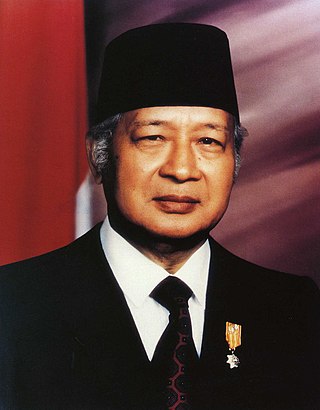
Suharto was an Indonesian military officer and the second president of Indonesia. Widely regarded as a military dictator by international observers, Suharto led Indonesia as an authoritarian regime from 1967 until his resignation in 1998 following nationwide unrest. His 31-year dictatorship is considered one of the most brutal and corrupt of the 20th century: he was central to the perpetration of mass killings against alleged communists and subsequent persecution of ethnic Chinese, irreligious people, and trade unionists.

Pramoedya Ananta Toer, also nicknamed Pram, was an Indonesian novelist and writer. His works span the colonial period under Dutch rule, Indonesia's struggle for independence, its occupation by Japan during the Second World War, as well as the post-colonial authoritarian regimes of Sukarno and Suharto, and are infused with personal and national history.

The Communist Party of Indonesia was a communist party in the Dutch East Indies and later Indonesia. It was the largest non-ruling communist party in the world before its violent disbandment in 1965. The party had two million members in the 1955 elections, with 16 percent of the national vote and almost 30 percent of the vote in East Java. At the time, it was the largest communist party in the world after the Chinese and Soviet communist parties.
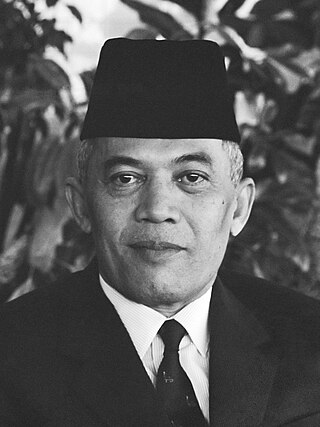
Abdul Haris Nasution was a high-ranking Indonesian general and politician. He served in the military during the Indonesian National Revolution and he remained in the military during the subsequent turmoil of the Parliamentary democracy and Guided Democracy. Following the fall of President Sukarno from power, he became the Speaker of the People's Consultative Assembly under President Suharto. Born into a Batak Muslim family, in the village of Hutapungkut, Dutch East Indies, he studied teaching and enrolled at a military academy in Bandung.
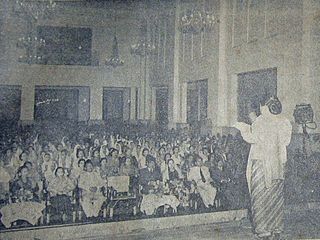
Gerwani was a women's organization founded as Gerwis in Semarang, Central Java, on 4 June 1950.

The New Order describes the regime of the second Indonesian President Suharto from his rise to power in 1966 until his resignation in 1998. Suharto coined the term upon his accession and used it to contrast his presidency with that of his predecessor Sukarno.
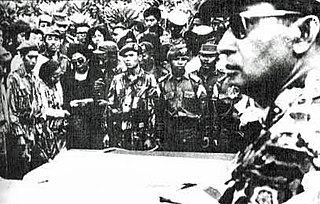
Indonesia's transition to the New Order in the mid-1960s ousted the country's first president, Sukarno, after 22 years in the position. One of the most tumultuous periods in the country's modern history, it was also the commencement of Suharto's 31-year presidency.
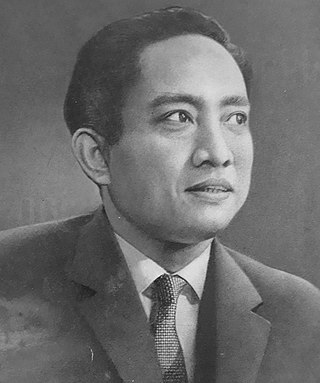
Dipa Nusantara Aidit was an Indonesian communist politician, who served as General Secretary of the Communist Party of Indonesia (PKI) from 1951 until his summary execution during the mass killings of 1965–66. Born on Belitung Island, he was nicknamed "Amat".
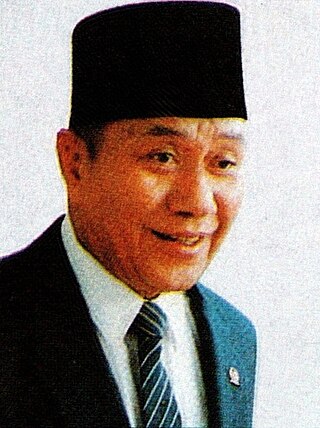
General (Ret.) Amir Machmud was an Indonesian military general who was an eyewitness to the signing of the Supersemar document transferring power from President Sukarno to General Suharto.
Lubang Buaya is an administrative village in Cipayung, East Jakarta, Indonesia, located on the outskirts of Jakarta near the Halim Perdanakusuma Air Force Base. It is the site of the murder of seven Indonesian army officers during the 1 October coup attempt of the 30 September Movement.
Kamaruzaman Sjam, also known as Kamarusaman bin Achmad Mubaidah and Sjam, was a key member of the Communist Party of Indonesia who was executed for his part in the 1965 coup attempt known as the 30 September Movement.

Lukman Njoto or Njoto was a senior national leader of the Communist Party of Indonesia (PKI), who joined the party shortly after the country's declaration of independence, and was killed following the 1965 coup attempt.

Large-scale killings and civil unrest primarily targeting members and supposed sympathizers of the Communist Party of Indonesia (PKI) were carried out in Indonesia from 1965 to 1966. Other affected groups included alleged communist sympathisers, Gerwani women, trade unionists, ethnic Javanese Abangan, ethnic Chinese, atheists, so-called "unbelievers", and alleged leftists in general. According to the most widely published estimates at least 500,000 to 1 million people were killed, with some estimates going as high as two to three million. The atrocities, sometimes described as a genocide or a politicide, were instigated by the Indonesian Army under Suharto. Research and declassified documents demonstrate the Indonesian authorities received support from foreign countries such as the United States and the United Kingdom.
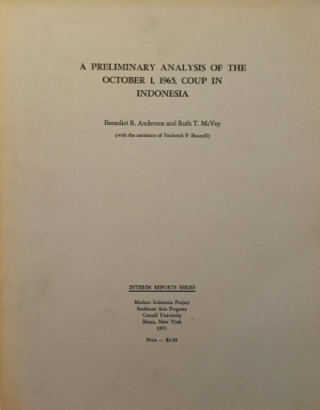
A Preliminary Analysis of the October 1, 1965, Coup in Indonesia, more commonly known as the "Cornell Paper", is an academic publication detailing the events of an abortive coup d'état attempt by the self-proclaimed September 30 Movement, produced on January 10, 1966. The study was written by Benedict Anderson and Ruth McVey, with the help of Frederick Bunnell, using information from various Indonesian news sources. At the time of writing, the three were members of Cornell University's network of graduate students and scholars on Southeast Asia.
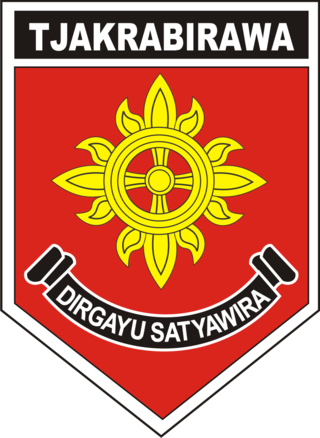
The Tjakrabirawa Regiment was the presidential bodyguard unit of the former Indonesian President Sukarno. It was disbanded in 1966 because of its involvement in the coup attempt of the 30 September Movement.
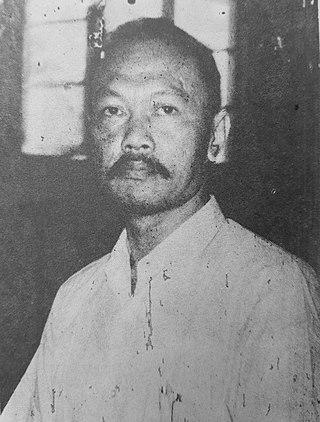
Mustafa Sjarief Soepardjo, also known as Supardjo, was a Brigadier General in the Indonesian Army. He was one of the leaders of the 30 September Movement, a group that killed six of the army's top generals and launched a failed coup attempt on 1 October 1965.

Pengkhianatan G30S/PKI is a 1984 Indonesian docudrama co-written and directed by Arifin C. Noer, produced by G. Dwipayana, and starring Amoroso Katamsi, Umar Kayam, and Syubah Asa. Produced over a period of two years with a budget of Rp. 800 million, the film was sponsored by Suharto's New Order government. It was based on an official history of the 30 September Movement coup in 1965 written by Nugroho Notosusanto and Ismail Saleh, which depicted the coup as being orchestrated by the Communist Party of Indonesia.

Asmu, whose birth name was Asmoe Tjiptodarsono, was a leader, theoretician, and chief agricultural expert of the Indonesian Communist Party (PKI) and head of the Communist-affiliated Peasants Front of Indonesia in the mid-1960s. He was killed during the Indonesian mass killings of 1965–66.
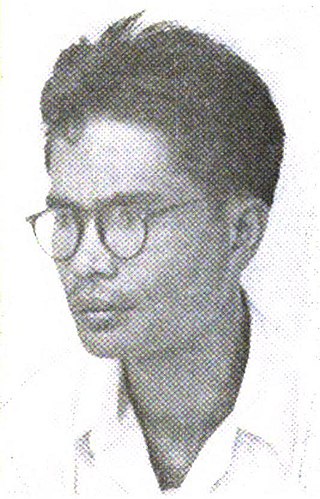
Peris Pardede (1918–1982) was an Indonesian politician who was a key figure in the Communist Party of Indonesia during the Sukarno era. He held various roles, including editor of the party magazine Bintang Merah, representative of the party in the Provisional House of Representatives and the House of Representatives throughout the 1950s and early 1960s, and Politburo candidate in 1965. After the party was banned in 1965, he was put on trial and spent his final decades as a political prisoner of the Suharto regime.
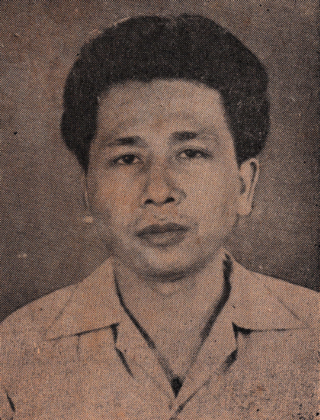
Njono or Njono Prawiro was a labor activist and member of the Politburo of the Communist Party of Indonesia (PKI). Njono was known as the Secretary-General and Chairman of the Central All-Indonesian Workers Organization (SOBSI) and a member of the Politburo of the PKI Central Committee who got involved in the September 30 Movement. Previously, Njono was a member of the Indonesian Labor Party (PBI) and served as its interim chairman.